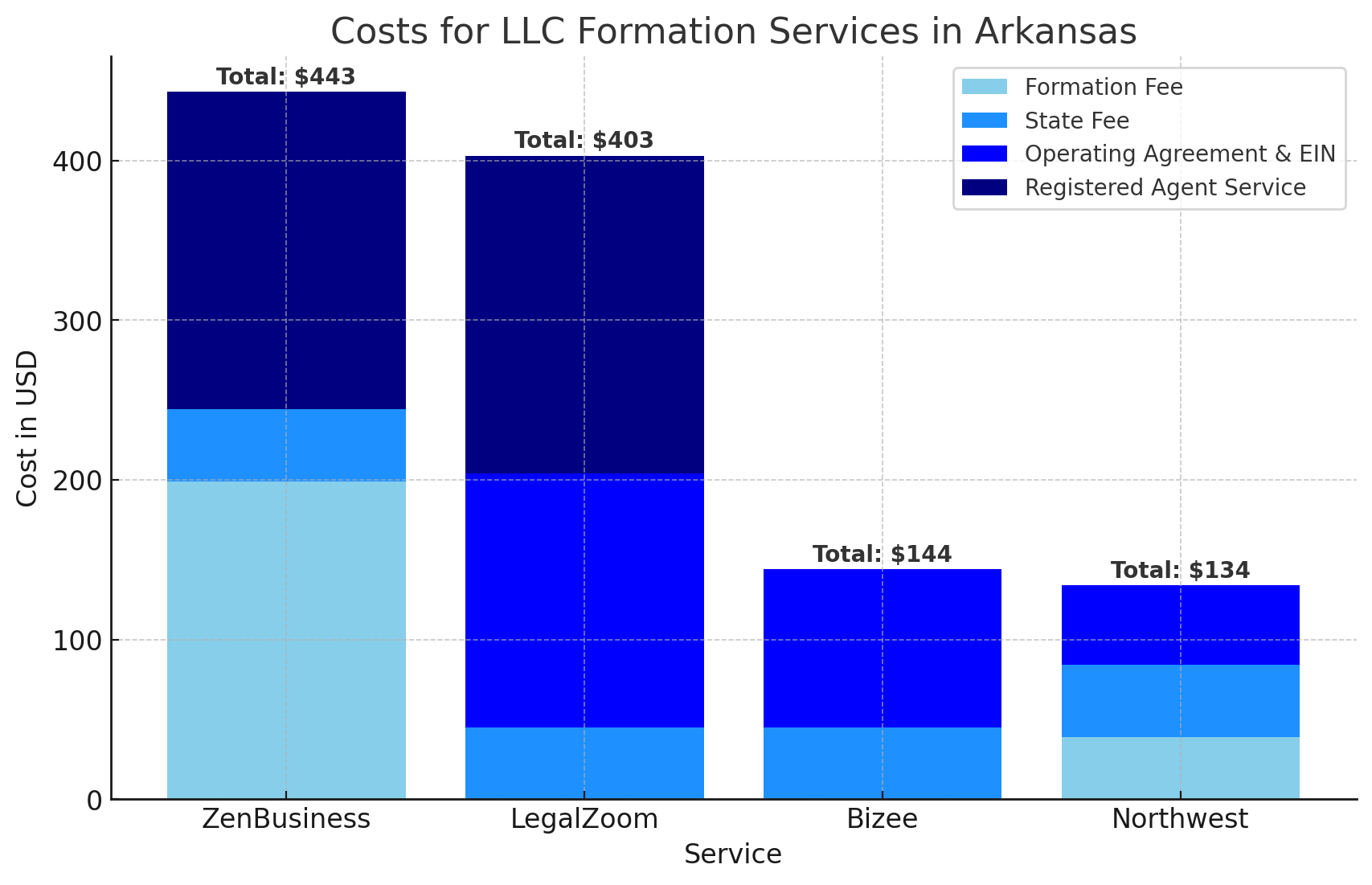Are you ready to turn your business idea into reality in Arkansas? Establishing a Limited Liability Company (LLC) in the state is a pivotal step towards your entrepreneurial success.
This guide simplifies the process of forming your LLC in Arkansas, breaking down each step in an easily understandable manner. Whether you’re a seasoned business owner or a first-time entrepreneur, this article will help you navigate through the essentials of Arkansas LLC formation.
Options for Forming an LLC in Arkansas
- Do-It-Yourself (DIY): For those who are confident in navigating legal processes and prefer to manage things independently.
Go to the Arkansas Secretary of State’s website to set up the LLC and then to the IRS’s website to get your EIN (Employer Identification Number). - Hiring a Lawyer: Recommended for personalized legal advice, particularly in complex situations.
- Using a Formation Service: A convenient and cost-effective option for many. Prominent services include ZenBusiness, LegalZoom, Bizee, and our top recommendation, Northwest Registered Agent.

This guide aims to provide clear and professional insights at each step of your LLC formation in Arkansas.
Steps to Form an LLC in Arkansas
- Choose Your LLC’s Name: The name should be unique in Arkansas and include “Limited Liability Company” or its abbreviations. Adherence to Arkansas’s naming guidelines is crucial.
For more information, check out Arkansas’s name requirements—listed in AR Code § 4-38-112. - Designate a Registered Agent: Arkansas law requires appointing a registered agent with a physical address in the state for handling your LLC's legal correspondence.
- File the Certificate of Organization: Submit this important document to the Arkansas Secretary of State, detailing your LLC’s name, address, registered agent, and management structure. The filing fee is $45 online or $50 via mail.
- Draft an Operating Agreement: Though not legally mandated in Arkansas, an operating agreement is vital for outlining the operational and management specifics of your LLC.
- Obtain an Employer Identification Number (EIN): Essential for tax and employment purposes, this can be obtained through the IRS website.
- Open a Business Bank Account: Separate your personal and business finances by opening a dedicated bank account for your LLC.
- Fund Your LLC: Capitalize your business through personal investments, loans, or other sources.
- Ongoing Compliance: Ensure to file an annual Franchise Tax Report and pay the $150 fee to maintain good standing with the state.
Setting Up Your LLC with Northwest Registered Agent
Northwest Registered Agent offers a streamlined LLC formation process. By clicking on the button below, you can use our affiliate link
and form your LLC in Arkansas for only $39, plus state fees. This exclusive offer also includes their registered agent service free for the first year, providing additional value and savings for your new business venture.
We get commissions for purchases made through links in this post.
Legal Considerations and Compliance in Arkansas
Compliance with state-specific regulations is key in Arkansas. Ensure your LLC name meets state criteria and maintain an accessible registered agent during business hours.
Regularly filing your annual Franchise Tax Report is essential for keeping your LLC compliant.
Benefits of Forming an LLC in Arkansas
An LLC in Arkansas provides limited liability protection, potential tax advantages, and flexibility in operations. The state’s business-friendly environment presents numerous opportunities for growth across various industries.
Common Mistakes to Avoid
Steer clear of errors such as overlooking legal obligations or merging personal and business finances. Stay informed, comply with state requirements, and seek professional services when needed.
Next Steps After Setting Up Your LLC
After forming your LLC, concentrate on developing a solid business plan, establishing efficient accounting systems, and marketing your products or services. Leverage tools and services for effective business management to ensure a prosperous journey.
Conclusion
Forming an LLC in Arkansas offers various paths, each with distinct benefits. While some entrepreneurs may choose DIY or legal assistance, many opt for formation services like Northwest Registered Agent for their efficiency and cost-effectiveness.
They simplify the process, ensuring your LLC is set up correctly and promptly.
Start an LLC in Arkansas FAQs
Can you be your own registered agent in Arkansas?
Yes, but if you act as your own registered agent in Arkansas, your name and address will be publicly listed. You'll need to be available during regular business hours to receive any legal documents in person.
Can I change my registered agent after I start an LLC?
Yes. It’s free to change your registered agent in Arkansas. You just need to file a Notice of Change of Registered Agent with the Secretary of State.
What’s the difference between a member-managed and manager-managed LLC?
If you go for a member-managed LLC, the members (owners) will handle the day-to-day operations. In a manager-managed LLC, members hire managers to run things. These managers take care of tasks such as hiring and firing employees, managing credit and bank accounts, and signing agreements and contracts.
What should be included in an operating agreement?
A personalized operating agreement addresses both the day-to-day and overarching aspects of your company, encompassing everything from member responsibilities to the dissolution of the business. Here are common topics typically included in operating agreements:
- Initial investments
- Profits, losses, and distributions
- Voting rights, decision-making powers, and management
- Transfer of membership interest
- Dissolving the business
Do I need an EIN for my Arkansas LLC?
Yes, you need an EIN if your business has employees, is a multi-member LLC, or is taxed as a corporation. Even if your LLC isn't legally obligated to have an EIN, it's advisable. An EIN allows you to open bank accounts, apply for business licenses, and is generally essential for business operations. It also helps keep your Social Security Number (SSN) private during business transactions.